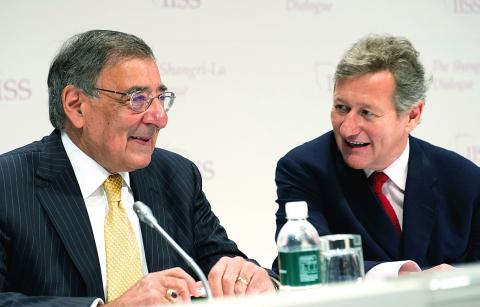There is “no other alternative” for the US and China but to boost military-to-military relations to manage disputes, US Secretary of Defense Leon Panetta said yesterday.
A robust security dialogue between the two powers is key to the prosperity of the Asia-Pacific region, Panetta told delegates to the Shangri-La Dialogue.
“Our relationship with China — we approach it in a very clear-eyed way. We are not naive about the relationship and neither is China,” he said in response to a question after a speech.

Photo: Reuters
“We both understand the differences we have, we both understand the conflicts we have, but we also both understand that there really is no other alternative but for both of us to engage and to improve our communications, and to improve our military-to-military relationship,” Panetta said.
Panetta said there would be “ups and downs” along the way, but it was vital to keep the lines of communication open.
“It’s to build that kind of relationship recognizing that we are going to have disputes ... that we are going to have conflicts, but also recognizing that it is in the interest of both China and the United States to resolve these issues in a peaceful way,” he said.
“That’s the only key to advancing their prosperity and to advancing our prosperity,” he added.
Before arriving in Singapore on Friday, Panetta told reporters aboard his plane that he had come away encouraged about the state of the US-China security dialogue after recent talks with his Chinese counterpart and other officials in Washington.
He said both powers must go beyond the mutual distrust that often characterized relations in the past.
“I think what both of us have to recognize is that we are powers in this region. We have common interests in this region, we have common obligations to try to promote peace and prosperity and security in this region,” he said at the Singapore summit.
In laying out core US principles in the region, Panetta made clear that Washington opposed any attempt by Beijing to make unilateral moves in its push for territorial rights in the oil-rich South China Sea.
Disputes had to be resolved through agreed-upon rules among all countries and based on international law, he said.
He also alluded to US concerns over China’s alleged cyber intrusions and spying, saying that in talks with Beijing the two sides had “agreed on the need to address responsible behavior in cyberspace and in outer space.”

AIR SUPPORT: The Ministry of National Defense thanked the US for the delivery, adding that it was an indicator of the White House’s commitment to the Taiwan Relations Act Deputy Minister of National Defense Po Horng-huei (柏鴻輝) and Representative to the US Alexander Yui on Friday attended a delivery ceremony for the first of Taiwan’s long-awaited 66 F-16C/D Block 70 jets at a Lockheed Martin Corp factory in Greenville, South Carolina. “We are so proud to be the global home of the F-16 and to support Taiwan’s air defense capabilities,” US Representative William Timmons wrote on X, alongside a photograph of Taiwanese and US officials at the event. The F-16C/D Block 70 jets Taiwan ordered have the same capabilities as aircraft that had been upgraded to F-16Vs. The batch of Lockheed Martin

GRIDLOCK: The National Fire Agency’s Special Search and Rescue team is on standby to travel to the countries to help out with the rescue effort A powerful earthquake rocked Myanmar and neighboring Thailand yesterday, killing at least three people in Bangkok and burying dozens when a high-rise building under construction collapsed. Footage shared on social media from Myanmar’s second-largest city showed widespread destruction, raising fears that many were trapped under the rubble or killed. The magnitude 7.7 earthquake, with an epicenter near Mandalay in Myanmar, struck at midday and was followed by a strong magnitude 6.4 aftershock. The extent of death, injury and destruction — especially in Myanmar, which is embroiled in a civil war and where information is tightly controlled at the best of times —

Taiwan was ranked the fourth-safest country in the world with a score of 82.9, trailing only Andorra, the United Arab Emirates and Qatar in Numbeo’s Safety Index by Country report. Taiwan’s score improved by 0.1 points compared with last year’s mid-year report, which had Taiwan fourth with a score of 82.8. However, both scores were lower than in last year’s first review, when Taiwan scored 83.3, and are a long way from when Taiwan was named the second-safest country in the world in 2021, scoring 84.8. Taiwan ranked higher than Singapore in ninth with a score of 77.4 and Japan in 10th with

China's military today said it began joint army, navy and rocket force exercises around Taiwan to "serve as a stern warning and powerful deterrent against Taiwanese independence," calling President William Lai (賴清德) a "parasite." The exercises come after Lai called Beijing a "foreign hostile force" last month. More than 10 Chinese military ships approached close to Taiwan's 24 nautical mile (44.4km) contiguous zone this morning and Taiwan sent its own warships to respond, two senior Taiwanese officials said. Taiwan has not yet detected any live fire by the Chinese military so far, one of the officials said. The drills took place after US Secretary